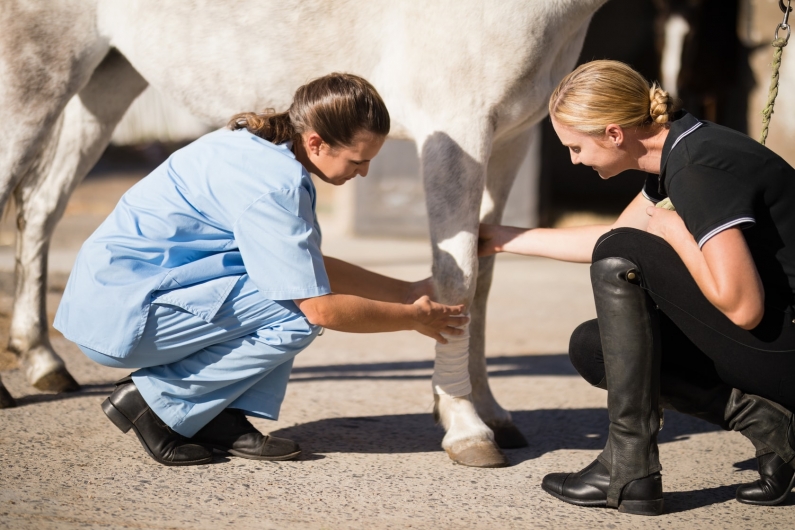
So you’re standing in the barn aisle, most likely with your vet, and you’ve received some not so great news. Your horse is injured. You’re going to need to begin the R word-that’s right, rehab. You run through a range of emotions from upset, to mad, to shocked, to relieved to have an answer. Breathe. You are not alone. Chances are if you are involved with horses, you have (or will) experience needing to rehab your horse at some point. Horses from competition horses in all disciplines to pleasure horses to pasture horses get injured. The biggest key is having a great team who are all on the same page. My team has always been my vet, my farrier, my trainer, and my barn manager.
Once the initial shock of dealing with the injury wears off, you are going to have a wide range of questions and particulars to think about. A lot of these questions will have to do with the type of injury, the treatment, who is involved with the horses rehab, and your barn set up. Some people prefer to rehab themselves while other pass the reins (or lead rope) over to a professional or a rehab facility. Here are some questions you should think about (and trust me there are plenty more!) to set you and your horse up for success in your rehab journey!
What is the injury?
Have your vet explain it. Ask plenty of questions. Don’t half hear and then go off googling worst case scenarios. Know the particulars to your horses injury.
What is the prognosis?
What is the best case and worst case scenario? Will your horse be comfortable? Will your horse be able (if all goes well with rehab) to get back to the “job” they were previously doing? How does this affect you?
What is the treatment?
This is a very involved question. Remember anything can happen. You need your plan A, B, C, D and so on. Then to cross your fingers that everything goes according to plan A. You want to know from your vet what the treatment is from-mobility, wrapping, hand walking, riding, turnout, PRP, shockwave, rechecks, cold hose, FastTrack, etc (more on this later!).
Who will be involved in horse’s care?
Are you planning to rehab, a mixture of people, a professional, or a rehab facility? It’s important to make sure everyone is on the same page and you are involved (as much or as little as you want to be!).
Will your barn be able to provide treatment when you are not there or if they are in charge of the rehab?
It’s important to know what your barn can provide and to be sure you are on board with it. From wrapping to hosing to hand walking to administering meds to holding for the vet to keeping an eye on your horse while in turnout or otherwise!
Will your barn be able to facilitate your horse’s accommodations?
Stall rest, small paddock turnout, etc. Can your horse see other horses in turnout or stall? Will anyone be at farm to keep an eye on if your horse is quiet in stall or turnout?
Can you graze, hand walk or tack walk?
Keep a log of what you can do with your horse and anything that happens during your activities.
Should you change your horses diet?
Again talk with your vet about this. Your horse may be in less work now and you want to be able to provide great nutrients without having them get “up”.
What additional can you do for your horse and do you have access to them?
Talk to your vet! Can you be adding anything in to help your horse- from Theraplate sessions to Aquatredding to PEMF to Back on Track products there are a lot of options available.
It’s important to dot all your I’s and cross all your T’s when it comes to planning for your horses’ rehab. Asking questions is better than wondering or worrying. Your team is rooting for you and your horse. Ask questions, write it down, check in with your “team” and GOOD LUCK!
About the author:
Jessica Halliday is the owner of Baile Hill/Farm and JH Eventing and is based out of Sutton, MA and Aiken, SC. Jess runs an active facility that provides lessons, training, sales, and rehabilitation for equine. Her program is geared toward passionate riders with emphasis on horsemanship while catering toward all levels of riding from recreational to serious competitor. Jess was named 2018 USEA Cornerstone Trainer of the Year. She is also the founder of Buck Off Cancer, a cause near and dear to her heart. When not in the barn you can find Jess rescuing dogs, freelance writing, or on some adrenaline junkie activity such as bull riding!

